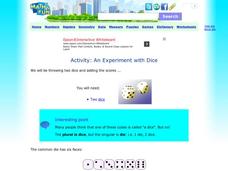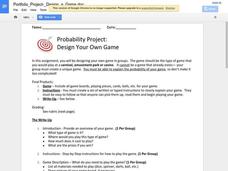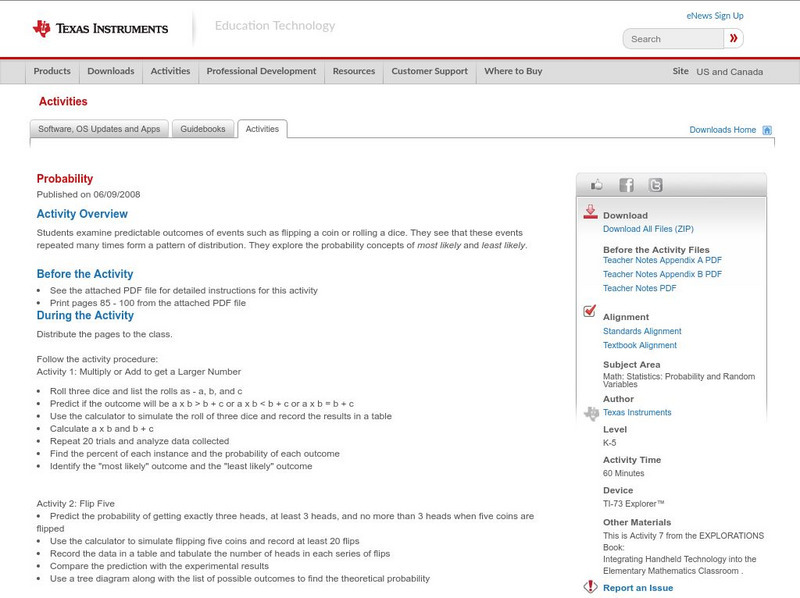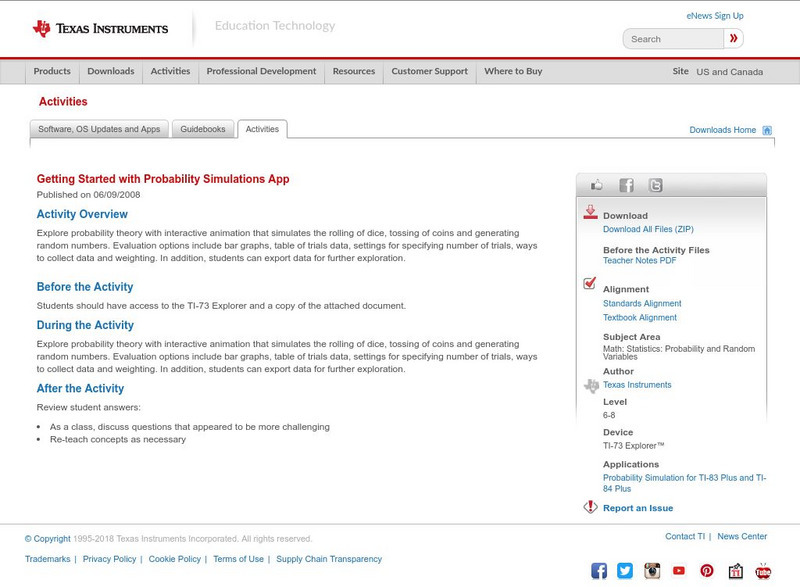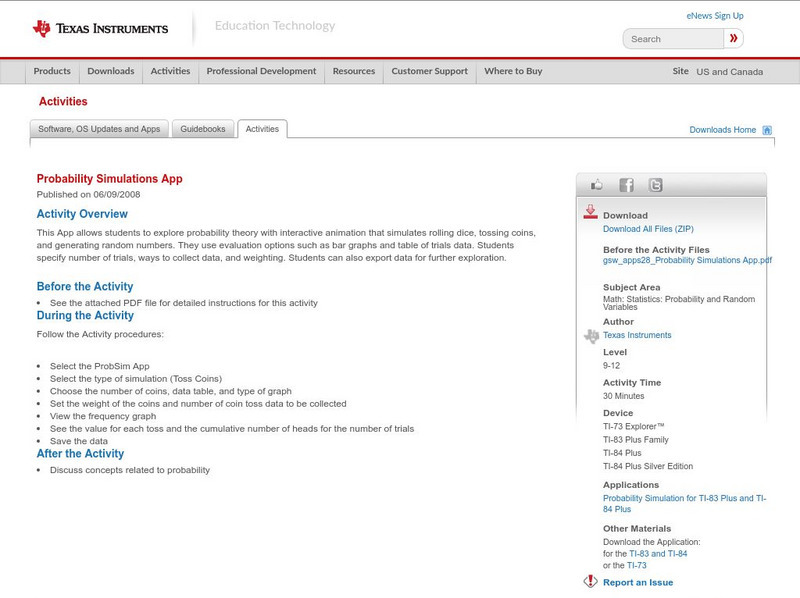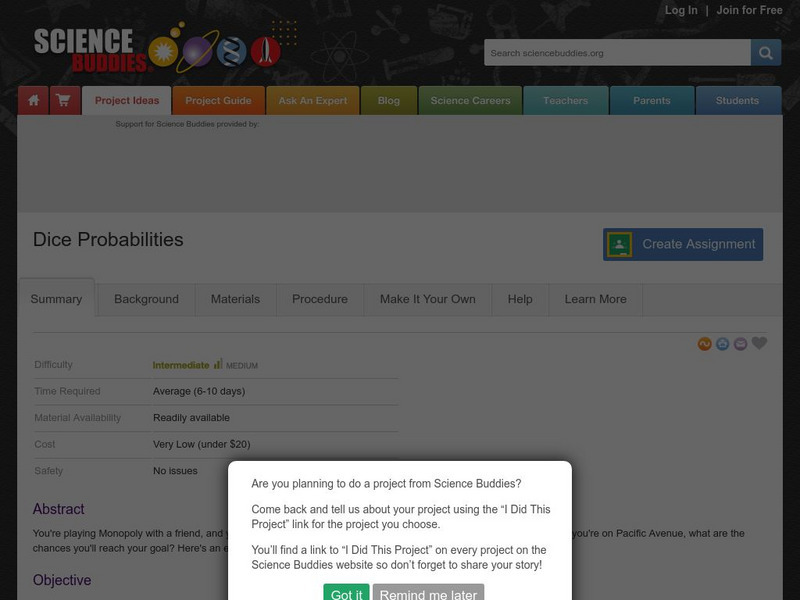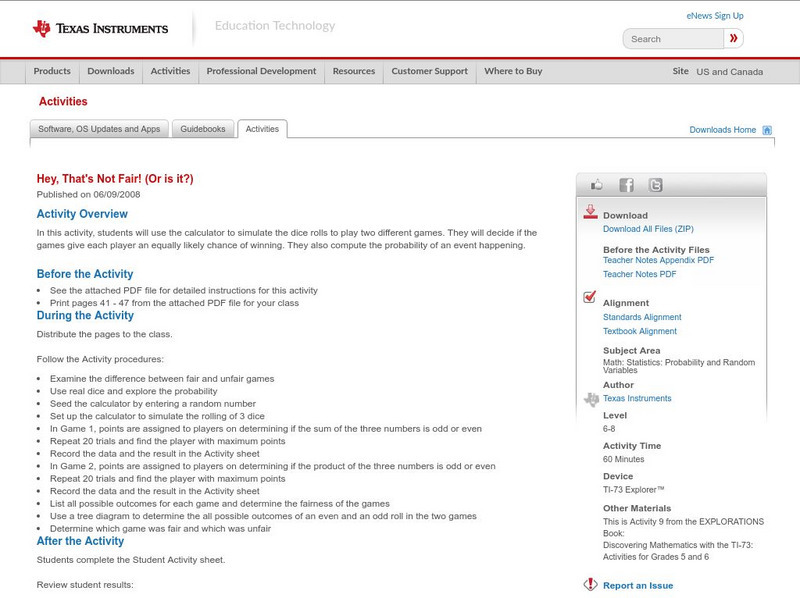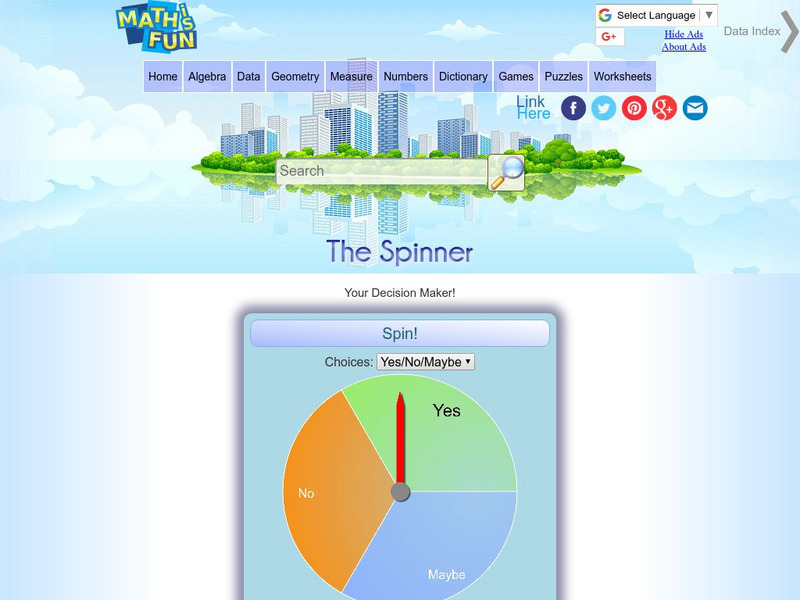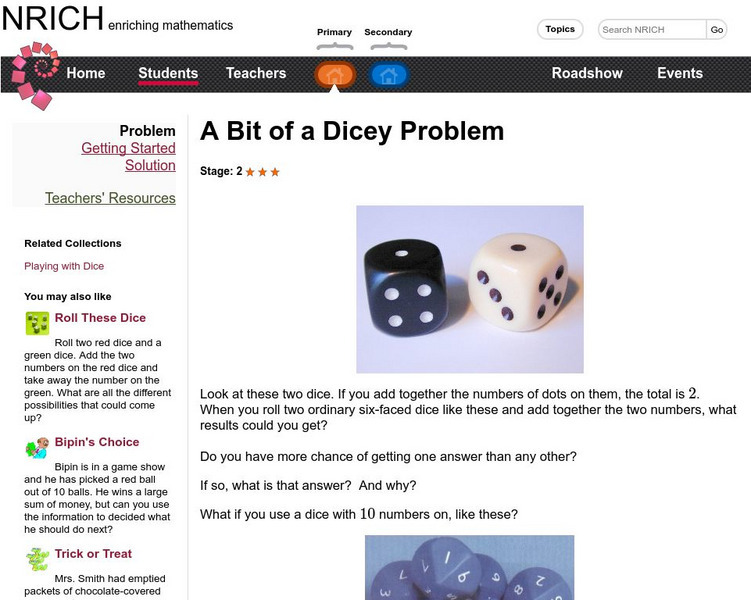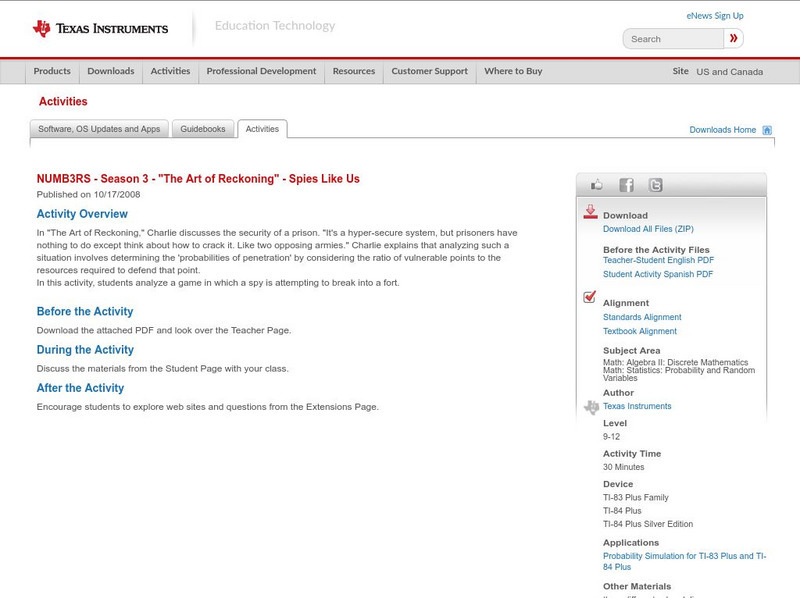Curated OER
Activity: An Experiment with Dice
Roll the dice with this activity and teach young mathematicians about probability. Record outcomes for rolling two number cubes in order to determine what is most likely to happen. Graph the data and investigate patterns in the results,...
Curated OER
Tetrahedral Dice
Put those thinking hats on and look at all the possible outcomes from rolling two different four-sided dice. The challenge in this problem is finding all the combinations when adding and subtracting the numbers from each die and creating...
Google
Probability Project: Design Your Own Game
Designing a game is the focus of this probability lesson. Groups develop and build a unique game, including directions for how to play, a calculation of the expected value of winning, and a personal reflection. The plan provides a...
Curated OER
Dice Games
Games and activities are wonderful for igniting interest in nearly any topic. With a pair of dice, your class will practice their basic math and social skills at the same time. Learners battle it out to see who can roll only odds or only...
Illustrative Mathematics
Rolling Dice
Rolling dice is a great way for your mathematicians to get a hands-on approach to probabilities. Use the chart to record whether they rolled a six during ten attempts. Calculate results individually (or in small groups) and then record...
Illustrative Mathematics
Tossing Cylinders
Everyone loves a lesson that involves throwing things around! To understand probability, your experimenters will predict how different cylinder-shaped objects will land when tossed. When the data is collected, they will calculate the...
Curated OER
Rolling Twice
Rolling dice is the best way to show your learners how probability comes in to play. Although this activity does not specify an activity, your mathematicians can try this probability with real dice to calculate their experimental...
Curated OER
Mathematics Activities from Diverse Cultures
Connect probability and odds with different games from around the world. Pick from games like Dreidel, Mancala, and a Navajo stick game called Ashbil. All 12 games include probability questions to encourage a discussion before or after...
Beacon Learning Center
Beacon Learning Center: Lions, Tigers, and Probability
Students explore the probabilities of simple events, such as rolling a dice, in this interactive web lesson.
Texas Instruments
Texas Instruments: Probability
Students examine predictable outcomes of events such as flipping a coin or rolling a dice. They see that these events repeated many times form a pattern of distribution. They explore the probability concepts of most likely and least likely.
Texas Instruments
Texas Instruments: Getting Started With Probability Simulations App
Explore probability theory with interactive animation that simulates the rolling of dice, tossing of coins and generating random numbers. Evaluation options include bar graphs, table of trials data, settings for specifying the number of...
Texas Instruments
Texas Instruments: Probability Simulations App
This App allows students to explore probability theory with interactive animation that simulates rolling dice, tossing coins, and generating random numbers. They use evaluation options such as bar graphs and table of trials data....
National Council of Teachers of Mathematics
Nctm: Figure This: Are Dice Fair or Not?
Is it fair or not fair? That is the question. Try this math challenge where you use your probability and number sense skills to determine whether or not a game is fair. Find out how mastering this challenge can be useful in real life...
Richland Community College
Richland Community College: Introduction to Probability
This site from Richland Community College provides an overview of probability including a list of probability rules. Several examples using dice are included.
Science Buddies
Science Buddies: Dice Probabilities
You're playing Monopoly with a friend, and you've already got Park Place and you really, really want to get Boardwalk. If you're on Pacific Avenue, what are the chances you'll reach your goal? Here's an easy project that will show you...
Math Is Fun
Math Is Fun: Activity: An Experiment With a Die
Explore probability with this dice experiment. Includes instructions for recording data on a table, creating a graph, questions to investigate, a probability formula, and a discussion of probability.
California State University
Cal State San Bernardino: Intro to Probability Models
The concept of random variables comes to life with this Applet used to roll one, two, six, or nine dice. The user selects the number of rolls to be completed, and the program quickly counts and graphs the results.
Texas Instruments
Texas Instruments: Hey, That's Not Fair! (Or Is It?)
In this activity, students can use the calculator to simulate the dice rolls to play two different games. They will decide if the games give each player an equally likely chance of winning. They also compute the probability of an event...
Math Is Fun
Math Is Fun: The Spinner: Your Decision Maker
This handy math spinner does most of the work for you. You can choose whether to use numbers, dice, yes/no, etc., and how many sections there are on the spinner. Then you spin it and it tabulates the results, creating a bar graph as it...
University of Cambridge
University of Cambridge: Nrich: A Bit of a Dicey Problem
Short website offers a look into the theoretical probability of tossing dice. Several questions related to the throwing of dice are included.
Texas Instruments
Texas Instruments: Numb3 Rs: Spies Like Us
Based off of the hit television show NUMB3RS, this lesson focuses on a spy trying to penetrate a fort's entrance, which is subsequently being guarded by three sentries. One student controls the spy and has a choice of where to move;...
Other popular searches
- Dice and Probability
- Dice Probability
- Math Probability Dice
- Probability Dice Games
- 2 Dice Probability
- Probability and Dice Graph
- Probability Dice and Cards
- Dice Probability Tree
- Probability Dice Roll
- Probability Dice and Coin
- Dice Probability Odds
- Probability Dice Activity
